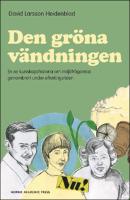Den gröna vändningen
En ny kunskapshistoria om miljöfrågornas genombrott under efterkrigstiden
Abstract
The Stockholm Conference 1972 drew the world’s attention to the global environmental crisis. To the inhabitants of Sweden, however, this threat to the planet and to humanity was nothing new. Anyone who regularly read newspapers, listened to the radio, or watched the television news would have encountered the issues. Five years earlier, in the summer of 1967, things were very different. At that time, it was not at all self-evident that humans were in the process of destroying their own living environment. Hence, in a short period of time, a radical change took place: an ‘environmental turn’. It had major and far-reaching consequences. But what was it that opened people’s eyes to the environmental crisis? When did it happen? Who set the ball rolling? And what does this historical process mean for us today? David Larsson Heidenblad’s book sheds new light on the emergence of modern environmentalism in Sweden and provides fresh insight to challenges that concerns us all.
Keywords
Environmentalism; History of Knowledge; Postwar period; Sweden; Stockholm Conference; New social movementsDOI
10.21525/kriterium.28Publisher
KriteriumPublication date and place
Gothenburg, 2021Classification
Environmentally-friendly (‘green’) architecture and design
History of science
Media studies
Political science and theory
Sociology
History


 Download
Download